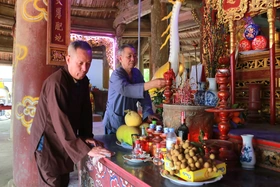{title}
{publish}
{head}
Every spring, hundreds of traditional festivals take place in Phu Tho, deeply reflecting the cultural identity of the ancestral land. To ensure these festivals are joyful, safe, and exemplary, authorities at all levels in the province have actively implemented a range of synchronized measures.

The role of the Confucian teacher in the “Tu Dan Chi Nghiep” vocational performance at the Tro Tram Festival, Tu Xa Commune, Lam Thao District.
During the early days of the Year of the Snake, people from across the country travel to the Hung Kings’ Temple, considered one of the most sacred places, to pray for peace in the coming year. To ensure the safety and comfort of pilgrims and tourists, the management board of the Hung Kings’ Temple Historical Site has taken steps to organize welcoming and guiding services, maintain road safety, security, and fire safety, manage cultural and spiritual practices, oversee tourism services, protect natural reserves, and ensure cleanliness and environmental protection.
Visitors to the Land of the Ancestors will have the chance to immerse themselves in the spiritual and cultural atmosphere of numerous folk festivals of Vietnam, some of which are recognized as national intangible cultural heritage, such as the Dao Xa Communal House Festival, the Au Co Mother Temple Festival, and the Tro Tram Festival.
To ensure that the Spring Festival of the Year of the Snake 2025 festival takes place safely, in an orderly manner, and retains its rich traditional cultural identity, the provincial authorities have directed efforts to enhance festival management and organization. Measures have been strengthened to maintain public order, traffic safety, and meet the cultural and spiritual needs of the people. Localities have proactively developed plans, strategies, and necessary preparations to ensure that festivals are conducted effectively, economically, and in line with civilized lifestyles and local cultural traditions.
Authorities have also instructed festival management boards and organizing committees not to sell tickets or collect participation fees. Revenue from festival activities must be managed and used effectively, with transparency and accountability. Regulations regarding donation boxes must be strictly followed. Additionally, foreign sacred objects or inappropriate artifacts that do not align with Vietnamese customs and traditions are prohibited from being placed in historical and worship sites. Most importantly, authorities are committed to preventing the misuse of festivals for spreading reactionary propaganda, inciting violence, promoting superstitious beliefs, circulating illegal cultural materials, or engaging in disguised gambling activities.
Promote communication efforts regarding the origins of festivals, historical sites, and the revered figures being honored, as well as the true values and meanings of traditional beliefs and rituals. Enhance tourism promotion through local handicraft products, distinctive and traditional goods; improve service quality in transportation, restaurants, hotels, ecological zones, and resorts. Strengthen information and publicity about attractive destinations, connect tourism routes, and encourage individuals and businesses both within and outside the province to participate in brand promotion and introduce tourism products to visitors.
Nguyen Viet Trung, Deputy Director of the Department of Culture, Sports, and Tourism, stated: "Festival activities and incense-offering ceremonies at the beginning of the new year are a beautiful part of the people’s cultural and religious life. Ensuring proper festival management at the start of the year not only contributes to a safe, civilized, and exemplary festival season but also brings the image of the ancestral land closer to the people across the country and international friends."
Thanh An

baophutho.vn The Ministry of Culture, Sports and Tourism has officially announced the updated List of National Intangible Cultural Heritages. Following the...

baophutho.vn On the morning of July 30, at Thuong Temple on Nghia Linh mountain within the Hung King Temple Historical Site, a delegation from the...

baophutho.vn Following the reorganization of commune-level administrative units, the Muong Vang region, formerly part of Lac Son district, was restructured...

baophutho.vn On the quiet Hill 79 in Hoa Binh Ward, nestled in the heart of the city along the Da River, lies a memory zone that quietly preserves the...

baophutho.vn The traditional art of creating skirt patterns among the Muong people, originally in Hoa Binh province, now part of Phu Tho province, has been...

baophutho.vn The Ministry of Culture, Sports, and Tourism has officially released the latest List of National Intangible Cultural Heritages, with the newly...

baophutho.vn The project to merge the three provinces of Phu Tho, Vinh Phuc, and Hoa Binh into a new Phu Tho province places high demands on solidarity and...

baophutho.vn With the desire not only to preserve the cultural space of the ancient Muong people but also to build a high-quality tourism destination rich...

baophutho.vn The Ministry of Culture, Sports and Tourism has officially recognized two traditional festivals in Phu Tho province as National Intangible...

baophutho.vn Phu Tho—the land of national origins—is home to more than 1,064 valuable historical and cultural relics. In recent years, efforts to enhance...

baophutho.vn On February 12 (the 15th of January in the lunar calendar), at the Tich Dien Site, Minh Nong Ward, Viet Tri City, the Hung Kings Teach Rice...

baophutho.vn On February 12 (the 15th of January in the lunar calendar), Huong Can Commune, Thanh Son District, will hold the 2025 Spring Khoang Communal...